Anyone who knows me well knows that I like trying new things especially in church life. Honestly, standard worship templates bore me. (And I think if I'm uninspired then I think others must be too!) So, I love thinking of creative ways to organize a worship service. I love making special Sundays of the liturgical year come alive for people.
The truth be told, I have some good ideas sometimes. But then, other times, I fail miserably.
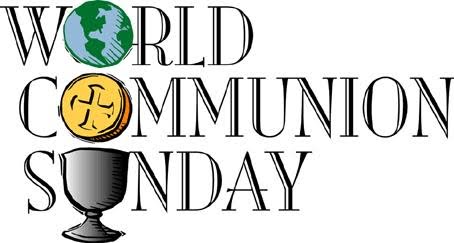 And, such was the case a couple of years ago when I was the pastor of Washington Plaza Baptist Church in Reston, Virginia. It was World Communion Sunday.
And, such was the case a couple of years ago when I was the pastor of Washington Plaza Baptist Church in Reston, Virginia. It was World Communion Sunday.
I need to preface the story I'm about to tell you by saying that Kevin was out-of-town for the weekend. Very important detail. He usually is the one that gives me that look which says, "Honey, I think you need to re-think that." But alas, on the eve of World Communion Sunday, 2012, I was alone and going over the bulletin. Mentally preparing for the next day, I felt remiss that I didn't plan a more interesting service when I was at my desk the previous Wednesday afternoon working on it.
So of course I went to Google. I found several examples of readings/ activities that could be a part of the communion liturgy. Several seemed easy enough to add in, especially with the bulletin already printed.
One website suggested that I bring several different types of bread to the table to use as a part of communion. Then I was told to invite an elder or deacon to read prayer for that country or region that the bread came from. Then when the time came to eat the meal together, the website suggested: let the members choose what kind of bread they want to dip in the chalice of juice (or wine). This sounded fun! I was sold.
But course, one problem. It was Saturday night. . . . I was already in my pajamas. Didn't want to make a trip to the store. Didn't think I'd have time to make a trip to the store on the way to church that morning either.
So off to my pantry I went. Surely I must have something interesting I could offer as "breads of the world" from my kitchen. And this is what I found:
Though I knew these weren't great choices-- not like the injera (from Ethiopia) or the naan (from India) or even the chapati (from Kenya) suggested on the website-- I decided to go with what I had. I could just change the liturgy to fit what my kitchen offered, right?
So on Sunday morning, I recruited three volunteers to help us pray for Hawaii and the Pacific Islands (with the Hawaiian rolls), for the Middle East (with the pita bread) and Jamaica (with the banana bread). Of course these places needed our prayers but maybe not the best representation of the world as a whole.
Ok, please laugh now.
Praying for Jamaica with the banana bread . . . and Hawaii with the Hawaiian rolls, really? Oh, but we did!
If that wasn't bad enough, after only a couple of people went through the line at the front of the church there were LOTS (and I mean LOTS) of floaties of banana bread in the chalice. I really shouldn't have made it extra moist the morning before.
My pastor friends now make fun of me yearly for this snafu. And my Anglican and Catholic friends are horrified.
So word to the wise all of you pastors and churchy types that will celebrate World Communion Sunday tomorrow-- don't get too fancy. Leave the banana bread at home. 
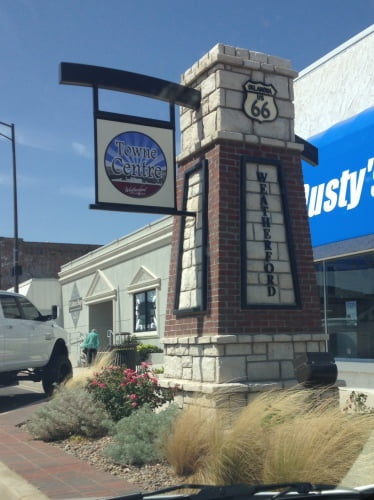 I wasn't sure I'd ever do it again. I wasn't sure if it was ever possible in Oklahoma. I wasn't sure how all the duel state life would come together.
I wasn't sure I'd ever do it again. I wasn't sure if it was ever possible in Oklahoma. I wasn't sure how all the duel state life would come together.
Too many people laughed at me when I asked them if they would hire me. Too much crazy travel has become the norm in our household that I didn't see any time available for a weekly committment. Too much uncertainty about the future.
But, it happened this week.
I accepted an interim position as Pastor of the Federated Church in Weatherford, OK. Weatherford is a small but growing town that hosts the college Southwestern Oklahoma State. It is also home to part of the historic route 66.
Yesterday, I was shown to an office, given keys and told the password for the church WiFi. People started visiting with me in my office. It became real fast!
Pastor Elizabeth is back in the regular business of church life.
Over the next several months, I'll have the opportunity to do more of what I love: preaching, pastoral care and assisting with administration.The church leadership has been kind enough to want to work around my schedule of all things Feed the Children and honors the fact that I want to stay connected as much as I can to my life in DC as well. So, I'll just be working part-time. I've noticed their favorite word so far is flexible and this really works for me!
Interestingly, this church is aligned with the United Church of Christ (UCC), Disciples of Christ (Christian Church) and the Presbyterian USA. And though my ordination is through the American Baptist Churches USA and I've served in United Methodist Churches before, they want me to lead them.
It feels like a great chance to live into what I say I believe: that I am an ecumenical Christian. What matters most is not the name of the church type on the door, but that we love Jesus and love each other.
Most of all, I'm so thankful to the Oklahoma/ Kansas UCC conference minister, Rev. Edith Guffey for connecting me to this open-minded congregation!
Stay tuned for more stories from this latest pastoral adventure!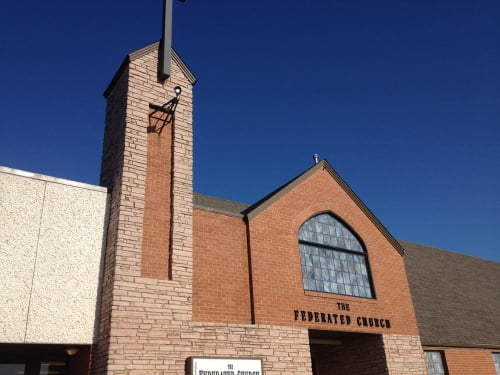
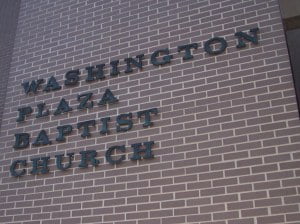 It has been a week when people who don't know me particularly well have asked me the question: "What kind of pastor are you?"
It has been a week when people who don't know me particularly well have asked me the question: "What kind of pastor are you?"
It's a funny question because I know that it comes with alternative motives. It's a litmus test question of sorts for folks to try to pin me into one theological camp or another. It's a question that people ask usually already having their mind made up as to what I'm like before they even met me. (I do have blonde hair, but let that not fool you!)
But no matter the motives of the hearers, I seek to answer truthfully. In honest and respectful dialogue, I hope whoever is asking the question and I can grow in relationship with one another from conversation. So, let me start:
So what kind of pastor am I?
- I am a pastor who seeks to model and lead authentic community. Going to church and being in Christian community, for me is all about being able to share one's life without fear of judgment. I tell folks all the time, "Come to church and be yourself. Don't worry about what you are wearing. Don't worry about what you say. Don't worry about having a prior understanding of faith. Just come as you are." And for this reason, I blog. I share my life with the congregation (and others of you out there too) as a way of being accountable to the type of life I desire to lead.
- I am a pastor who thinks Christ calls us to welcome all people into the church. No matter what. And, I mean ALL people. See the mission statement on the front of our church website if you don't believe me. I could not go to a church that didn't have all flavors, colors and languages of people anymore. Without people who don't look like us in the pews and around the tables, our view of the gospel is stunned.
- I am a pastor who doesn't think that it is my job to "lord" over the congregation. We are Baptists after all and part of what it means to be Baptist is the priesthood of all believers. I see to learn from my congregation members as much as I ask them to learn from me.
-I am a pastor who knows that living together in community is hard, but well worth the effort. It's tough work being church, especially when disagreements arrises and feelings are hurt. But God always calls us to take the higher ground to love and support our brothers and sisters in Christ even if we don't 100% agree with them.
 -I am a pastor who may not look like, talk like, dress like or act like what you expect out of clergy, but it doesn't make me any less called or faithful to the gospel of Jesus Christ to which I cling. People tell me all the time, "You don't look like a pastor." And, I always reply, "Well, come hear me preach and then decide if I look like a pastor to you then." (Usually, minds are changed)
-I am a pastor who may not look like, talk like, dress like or act like what you expect out of clergy, but it doesn't make me any less called or faithful to the gospel of Jesus Christ to which I cling. People tell me all the time, "You don't look like a pastor." And, I always reply, "Well, come hear me preach and then decide if I look like a pastor to you then." (Usually, minds are changed)
-I am a pastor who knows it is my job to love, care for and support the spiritual journeys of any God brings to my congregation. This means you will find me at the hospital, in homes, on the phone and talking over text with church members as needed. You can't be a pastor unless you know your people.
-I am a hands-on pastor not afraid to work in the kitchen, bake for the Sunday lunch or attend a Bible Study even if I am not leading it. Sometimes we just need extra hands to get the job done. I'm willing to be used in whatever way if it means I'm encouraging others to learn to use their gifts for service in the church too.
- I am a pastor who isn't afraid to speak up on issues of justice, even when this doesn't make me the most popular person. Consider this recent challenge on fear of change that I wrote for the Associated Baptist Press.
If you are looking for a church to worship with this Easter Sunday in the Northern VA area, know that this pastor and my wonderful church can't wait to meet you. (See our website for worship times this weekend). Together Washington Plaza and I are blazing a new trail of what the church will look like in the 21st century! It's exciting work and I'm proud to be the pastor of my lovely, open-minded and faith seeking congregation.
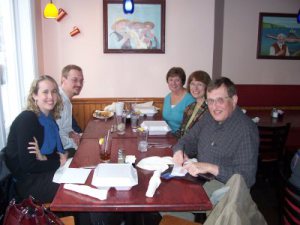 I heard the sad news this afternoon that on September 30, my friend Joe Smith had passed a way. After struggling for several months with lung cancer, loosing his voice and later his strength, he ended his fight last week. He left this earth too soon!
I heard the sad news this afternoon that on September 30, my friend Joe Smith had passed a way. After struggling for several months with lung cancer, loosing his voice and later his strength, he ended his fight last week. He left this earth too soon!
When Joe and I first met, I was one of the pastoral associates at First Baptist Church of Gaithersburg, Maryland. He entered the picture as Interim Pastor hired by the church leadership to come and "supervise" the "young pastoral staff" because we weren't seen as capable of leading the church in the transition. If you know me well at all, you know that such an intention of the church leadership was not agreeable to me-- I felt hurt and overlooked for the gifts I could bring to the church at this crucial time. So, especially in our first couple of interactions there was tension. Joe wondered why I wanted to preach so much as the previous Senior Pastor had allowed and seemed unsure of what to do with me . . and I wasn't sure what would happen. At best, I hoped that we could work together in ways that were helpful to the church. (Pictured to the right was the staff)
But as is the case in most relationships, when you move from knowing "of" someone to actually knowing them, things quickly change. As time went on and Joe heard me preach and I watched him lead, we soon gained respect for one another at a deep level, even with our theological differences. I knew he wanted me to succeed. He knew I would soon be a senior pastor, the question would just be where? I knew the church was blessed by his ministry. On countless occasions we would have long chats about how to best respond to moments of crisis within the congregation. Joe would carefully listen to my perspective and always made me feel like a valuable part of the team. I learned so much from him about how to lead when you aren't in charge, the importance of sermon series in shaping the life of the church and how to really love being a pastor.
When we had lunch one afternoon in Bethesda, three years ago now, I told Joe the news I dreaded to share. I would soon be leaving FBCG to become the pastor of Washington Plaza. He quickly put me at ease and cheered me on for this new adventure.
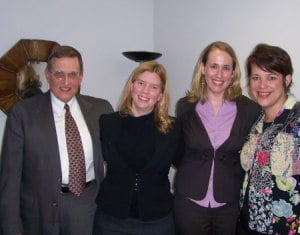 On my first Sunday at Washington Plaza in January of 2009, I found flowers on the altar that I knew he'd arranged to be present there in support of the day. And, when Washington Plaza installed me as their 4th pastor, Joe came again-- this time to give the "charge" to me to look to the future in ministry. He's pictured to the left alongside the two other speakers for the special occasion.
On my first Sunday at Washington Plaza in January of 2009, I found flowers on the altar that I knew he'd arranged to be present there in support of the day. And, when Washington Plaza installed me as their 4th pastor, Joe came again-- this time to give the "charge" to me to look to the future in ministry. He's pictured to the left alongside the two other speakers for the special occasion.
Over the past several years, we've kept in touch though we no longer worked together. I was given several wonderful volumes from his library that he was cleaning out and wanted to give to some "young pastors." (This time I didn't mind being called "young"). I found out that Joe was reading my blog and was eager to comment if something I wrote connected with him in any way. Joe was also quick to send me an email about news of shared friends. For he never wanted me to be out of the loop.
Joe was kind and thoughtful in ways that were attentive to detail but were never showy or over the top. He left a legacy of faithfulness in so many communities of well-edited documents, quick humor and preaching on his toes.
I will miss Joe and know some angels in heaven must be rejoicing about now as he is at peace. I am sorry, Joe, that I never got to say good-bye! I am forever grateful for your contributions to my life. With my deepest regards-- your last associate pastor trainee.
Does calling to a particular congregation automatically mean you are required to give your whole life to a particular group of people?
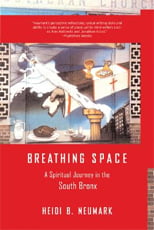 Recently, I finished a wonderful pastoral memoir called Breathing Space: A Spiritual Journey in South Bronx by Heidi Neumark. Heidi is a Lutheran pastor who writes about her 20ish year journey with a congregation in transformation in a neighborhood also in transition. Pastor Heidi lived in the neighborhood where she worked and full enmeshed herself and her family (husband and two children)-- worshipping, playing, and shopping in the blocks surrounding her church.
Recently, I finished a wonderful pastoral memoir called Breathing Space: A Spiritual Journey in South Bronx by Heidi Neumark. Heidi is a Lutheran pastor who writes about her 20ish year journey with a congregation in transformation in a neighborhood also in transition. Pastor Heidi lived in the neighborhood where she worked and full enmeshed herself and her family (husband and two children)-- worshipping, playing, and shopping in the blocks surrounding her church.
The journey Pastor Heidi described I found much kinship in, even though our settings are quite different. She arrived at a congregation without the physical, emotional or spiritual infrastructure for long-term survival. She was greeted, nurtured and sustained in her early years there by some amazingly faithful saints of God who inspired her to fully commit herself to the work at hand. She saw in her diverse faith community great potential.
While it was a beautiful journey to read about, I begged to ask myself the question on countless occasions while reading it, how in the world was this pace of life sustainable? And, it seemed that Pastor Heidi asks herself this question over and over again too; thus, the title of the book, breathing space.
Yet, there were points in the book where my heart stirred for her because it seemed that she was so close to finding the answers but just kept on working "for God."
Consider this, Heidi Neumark writes:
We had a German student, Bend, staying here and visiting the church for two months. At the beginning, he asked me about friendships in the parish and how it worked to maintain friendships in other places. I said that it was hard to do because most of our friends now lived at some distance, but that it didn't bother me at all. My work and my family were more than enough. When I said it, I believed it was true. But I remembered exactly what I was doing when he asked the question. I was standing at the sink washing pesto of the dinner plates. I remember the Brillo pad in my hands, the pieces of green pasta and bits of garlic stuck to the plates, the running water. I washed dishes countless time since then, but I can't remember one. I was fooling myself when I thought it was an easy question.
It is true that my work and my family fill my heart and occupy my days. . . . It was easy to become Bernd's friend because it was convenient. He was right there. When he left, I had to ask myself-- am I sad because Bernd is leaving or because another friend is moving out of reach? It was both. But friendship is not always, or at least in my circumstances, not usually convenient. (90-91).
Of course, friendship is not always convenient. It really isn't, and usually the things that are most life-giving to our souls aren't.
One of the biggest sins, I think, of those serving in pastoral ministry is regularly doing what is right in front of us. Someone need to go to coffee? I'm there. Someone in the hospital for the fifth time this month? Sure, I'll visit them again. Need someone to serve on this denominational board? Sure, I can go to those extra meetings. We just aren't good at saying, "No" or "Later."
I believe such practices are where we as pastors hide, under the banner of "the busyness of ministry." To this, I say, ministry is only as busy as we make it. Of course there are unexpected funerals. Of course there are unexpected building issues. Of course there is someone who needs to talk on a day when such is not scheduled. But, when we look at our calendars, as ministry leaders, are we intentionally making time for things that matter to us?
Are we finding breathing space through relationships outside of the church?
Are we talking time each week to remember we are always more than our jobs?
Are we finding more out about the people God has made us to be so that upon retirement we aren't just starring at the walls wondering who we are without the church to tell us?
The longer I read Pastor Heidi's memoir, the longer, I wished for her a long retreat with some of the dear friends that she mentions moving away. I wished for her a longer time a part each year from her church so to get an even great respect for its context. I wished for her peace, so not to feel as if she was carrying this burden of a church in transition alone.
Breathing space after all, I don't think just comes to us. We have to grow a place in our souls and calendars for it to live. And, how beautiful such space can truly be!
 Normal patterns of ministry outreach for children during the summer for churches is a little thing called Vacation Bible School or better known as VBS. The basic idea is that a summer's worth of educational curriculum is packed into one week of the summer during either a day or night camp at a local congregation. It's usually a great introduction for children and their parents to a local church, an introduction that families may not otherwise of had without the draw of VBS. While fun for kids, it is a lot of work to pull together in terms of volunteers, supplies and promotional materials. And, often churches of small membership just don't have the funds, personnel, or energy to pull something like this off-- as much as they say they want to be welcoming to children.
Normal patterns of ministry outreach for children during the summer for churches is a little thing called Vacation Bible School or better known as VBS. The basic idea is that a summer's worth of educational curriculum is packed into one week of the summer during either a day or night camp at a local congregation. It's usually a great introduction for children and their parents to a local church, an introduction that families may not otherwise of had without the draw of VBS. While fun for kids, it is a lot of work to pull together in terms of volunteers, supplies and promotional materials. And, often churches of small membership just don't have the funds, personnel, or energy to pull something like this off-- as much as they say they want to be welcoming to children.
Such has been the stance of Washington Plaza Baptist for years. With limited resources, there hasn't been money or time or support to get a traditional VBS or something like it on the calendar. As much as the congregation would have desired to host a week of children's fun, there was really no way that we could pull it off by ourselves.
When I arrived at WPBC almost three years ago now, we didn't have a history of children's summer programs at all. I knew in due time this would have to change.
Yet, one of the greatest lessons I learned in seminary about congregational ministry is that it is ALWAYS contextual and the accepted norms must always be pushed just a little. Programmatic one-size fits all curriclum just work if you don't consider the neighborhood. And there ARE things you can do even beyond all imagination!
This is what is true about our situation:
1. We are in community with merchants and individuals directly. Sitting on a plaza alongside restaurants, shops and tenants alike, we have a direct presence in our particular neighborhood-- more than most-- that can't be ignored.
2. While we don't have the visibility on greater social networks or a PR chairperson in our congregation, we are connected to a neighborhood, Lake Anne, that does.
3. While we don't have the personnel to pull off a week's worth of Sunday School like activities for kids, a small committment of time (i.e. one night a month, for a month) IS something we can ask of our congregants. Vacation and busy work schedules can work around this type of commitment.
4. While we don't have a budget line item for supplies, we do have some amazingly talented resources people in our midst who can (and have) written curriculum, found supplies and donated snacks so that we have absolutely everything we need to make a children's event work.
To all of this context and culture, Washington Plaza came up with the idea this spring to further expand our partnership with the neighborhood we've established the past two years through "Family Fun Night" block parties morphing them into "Fabulous Fridays" a modified Vacation Bible School for kids on Friday evenings in July. We are marketing it as a "Parent's Night Out" or "Parent's Date Night" with support from the local merchants who are giving out dinner coupons for any who leave their kids with us. What a beautiful combo!
All the fun began last week as we learned about the story of the Good Samaritan, made crafts, ate cupcakes and chicken nuggets and played some cool games and sang songs. And, I'm sure some of the adults had even more fun than the kids!
This is what I know for sure: as the children are learning about what it means to "Grow in Faith" this summer during Fabulous Fridays, our congregation is doing just the same. We're growing in our understanding of outreach. We're growing in our desire to be a valuable member of the Lake Anne community. We're growing in our passion to share God's love with all of our neighbors. It's a great experience for all.
See y'all tonight at 6:30!
No matter if a church really means it, it's been a rarity that I've found a church that doesn't say it is welcoming to the community. They want newcomers. They want new members, preferably those who tithe or bring in income. They want (or at least just appear) to be open to using their building for the good of their neighbors.
But, yet with all of this true, when push comes to shove, it is always harder than it seems.
In my father's church I that grew up in, I can remember a time when the congregation made an over-the-top gesture to allow the neighborhood Boy Scout Troop to meet in the fellowship hall for free. Everyone was excited about it. I mean, who doesn't want to help out the Boy Scouts? And if the church got new members out of it, even better!
This enthusiasm ended, however, the Sunday morning when the church parishioners arrived to find that not everything was in  order. Several of the scouts had taken the costumes for the children's Christmas play and re-arranged them. They moved Ms. Faye's cheese (i.e. the props for the children's play) and she didn't like it one bit . . . the sheep wool was gone. Later it was found out that the unsupervised boys had removed the cotton stuffed in the sheep's costumes and tried to flush it down the toilet. The downstairs bathroom was overflowing and talk of "those Boy Scouts" was on the lips of everyone in the sanctuary that morning. The chairman of deacons (who was married to Ms. Faye of course) demanded that the church kick the boy scouts out immediately.
order. Several of the scouts had taken the costumes for the children's Christmas play and re-arranged them. They moved Ms. Faye's cheese (i.e. the props for the children's play) and she didn't like it one bit . . . the sheep wool was gone. Later it was found out that the unsupervised boys had removed the cotton stuffed in the sheep's costumes and tried to flush it down the toilet. The downstairs bathroom was overflowing and talk of "those Boy Scouts" was on the lips of everyone in the sanctuary that morning. The chairman of deacons (who was married to Ms. Faye of course) demanded that the church kick the boy scouts out immediately.
But what about Christ's welcome? What about living in community with neighbors?
On Sunday morning at Washington Plaza, as a group arrived to set up for our Sanctuary on Sabbatical worship series in the Plaza Room, we too had our limits of welcome pushed too.
God has blessed our congregation with facility whereas many churches in our area do not. We are happy to open up our building to the community and are grateful that the income received from this helps to support our mission and ministries. We are eager to be of support to any community group that can be blessed by our space, including new church starts.
One of the churches that meets in our building seems to continually have a supervision problem when it comes to their children. They meet on Saturday and Sunday evenings in the Plaza Room. It's a normal practice to walk in on Sundays and find food left out from the previous night's fellowship, markings on the wall, or one of locks in the children's ministry cabinet broken. But, usually it isn't too bad. We keep trying to teach, being forgiving and kind.
But the thorn of this problem keeps returning and getting worse!
 This Sunday, we found gum on the floor, caked dirt on the floor and carpet in the entry way, children's supplies, stolen, and locks taken off the supply cabinets. Can I just say the word, gross!! It looked like a scene out of Pippe Longstockings.
This Sunday, we found gum on the floor, caked dirt on the floor and carpet in the entry way, children's supplies, stolen, and locks taken off the supply cabinets. Can I just say the word, gross!! It looked like a scene out of Pippe Longstockings.
We too wondered what we should do. Of course love of neighbor always means boundaries. The question is: "Where are those boundaries?"
But, these are some of the hardest questions that churches, especially urban ones wrestle with every week. For to be loving doesn't mean you get to be abused or kicked to the curb either. So, where is the line?
Know that our relationship with this congregation is being prayerfully examined by our Trustees and we would ask for your prayers too as we try to work out what is best for both of us.
I guess, I'll add Sunday's adventure in pre-church cleaning and conflict management to the list of things I never learned in seminary that community building is all about: gum on the floor, cotton stuck in the toilet and all.
 The way I see my job-- its role is often to take the mission of the church into places where it might not otherwise go especially when it comes to hanging out with folks who have few (if any) positive experiences with a church or a pastor. It's an area of ministry that I find myself doing more of than I would have ever imagined six years ago when I graduated seminary but I love it!
The way I see my job-- its role is often to take the mission of the church into places where it might not otherwise go especially when it comes to hanging out with folks who have few (if any) positive experiences with a church or a pastor. It's an area of ministry that I find myself doing more of than I would have ever imagined six years ago when I graduated seminary but I love it!
This past week, being Pride week in DC, I had two opportunities to do just this. Pride week, for those of you who might not be familiar, it's a week of celebration. It's a great opportunity to rally, gather affirmation and to bless a group of people who have often been bullied, alienated and not given the respect they deserve for their contributions to our society.
Even more so, in a faith context, when so many literal interpretations of scripture have been taken out of context to encourage a message of hate or even worse the standard, "hate the sin, love the sinner" motto toward our LGBT brothers and sisters, there's so much peace work to be done by churches. It's a wonderful outreach opportunity to say that not all churches are what you think!
So, when I was asked by Kharma Amos, the pastor of MCC Northern VA to speak a word about progress made in the Baptist church toward the LGBT community at the Northern VA Interfaith Pride service on Wednesday night, I was glad to attend. Such would be a new experience for me, and I wondered if a Baptist pastor had ever been asked to be on the program before?
Though the style of prayer and worship was a bit different to what I am accustomed and I was astonished to find that I was the only clergy who was willing to say the name "Jesus," (really what is so bad about Jesus, I wondered? He's the most inclusive loving guy I know), I enjoyed making new friends in the gathering. It was wonderful to be warmly received.
When time came for me to give my remarks about what Baptists are doing in the area of equality for the LGBT community, I could simply talk about my own experience. I told about how an internship at an open and affirming Baptist church helped guide me to seminary many years ago. I told of how some Baptists have been united in the welcoming and affirming movement for years, especially those found within the Association of Welcoming and Affirming Baptists to which Washington Plaza is a supporting congregation. I talked about how having an "all are welcome" stance has been such a blessing to our local church both for the gay and straight members-- for it is good to simply be together and realize we have more in common than we might first think. Being gay is just a non-issue.
The shock of all shocks were the looks of disbelief I got from the crowd when I talked about a church open to gay members in Reston, Virginia of all places! It was as if I was speaking about something that folks never thought possible and my good news was that it had already happened. One woman was crying.
After the service, countless folks came up to me and wanted to share stories about "when they used to be Baptist" or "when the Southern Baptists went crazy" and in receiving all of these words of encouragement, I looked at our music director also attending gathering and said to him, "You've been right all this time. There's so many people out there who have no idea that we exist and are elated to know!" I ran out of business cards because I was passing out so many!
The same sentiment was true when a group from Washington Plaza hosted a booth at the Capitol Pride street festival on Sunday downtown DC. Though our booth somehow got mixed into the "children's area" away from the main traffic of Pennsylvania Ave. we met with a steady group of participants as we gave them our sticker: "Whosoever Means You" with our church name and website. There were several folks with the same blank stares on their faces as they saw the word, "Baptist and Accepting" in the same sign. Such began some interesting conversations for sure.
I'm so proud to be a part of a congregation which isn't afraid to say that you can be Christian and gay at the same time, saying the good news of Jesus is not exclusive. I'm proud to be the pastor of a Baptist church whose desire is to learn how to welcome any who find us and those who don't know they need us quite yet.
I look forward to the day when churches like WPBC, are not unusual, but the norm.
 My world is the fast paced, traffic filled, takes you 45 minutes (if you are lucky) to get on the other side of town environment of DC. It's a world of people who are savvy and excited about enjoying life. It's a world of independent, overachievers who want to make a difference in something that they believe in. It's a world where at every point you turn around you'll find a room full of overcommitment people multitasking. (Seen anyone at dinner with a cell phone in hand lately?)
My world is the fast paced, traffic filled, takes you 45 minutes (if you are lucky) to get on the other side of town environment of DC. It's a world of people who are savvy and excited about enjoying life. It's a world of independent, overachievers who want to make a difference in something that they believe in. It's a world where at every point you turn around you'll find a room full of overcommitment people multitasking. (Seen anyone at dinner with a cell phone in hand lately?)
The energy that surrounds my city is contagious. Not only is DC a populated urban area, but politics is a part of life in everything that happens around town. It draws you in quickly and invites you to join its own rhythm as it did for me the first time six years ago in the summer of 2005. Living in a city and region such as this is truly exciting, no matter what party is in office! There's always such fun things to do. There's always such fun folks coming through town. It's a great place to live . . . don't get me wrong.
Yet, with all of this being the case, I've been pondering lately how the lifestyle of "every weekend booked weeks in advance" "working every night until 8" and "a day off, what is that?" is simply too much.
This spring I've had the opportunity to travel more than normal-- both for professional events and vacation-- each of these trips which just happened to be in peaceful places: Sedona, AZ, in the mountains of Ashville, NC and then recently to Harper's Ferry, WV. Being in a place where you can hear the birds and see the rich colors of the trees and stare up at the brightest blue sky, has slowed me down to the point of being reminded that DC culture of let's out achieve everyone else is just not normal. And, it might be too much.
From the pastoral lens that I see life through, I know that God has called each of us to life that is abundant. Not abundant in the sense of getting everything we want like some tv preachers are frequently speaking about, but having a life that is rich in relationships, rich in quiet time, rich in jubilation, rich in contributions, and rich in time to process life's harder moments. But, finding balance in all of this and being in an emotional and spiritual place to receive it, takes having "time out" days that grow into "time out" lifestyles. For simply learning part of what it means to be human is realizing our limitations.
Limitations is not something that the idealistic crowd and the churches that pastor such folks often want to hear, but it is true. Unless you or I woke up this morning and found out that our name was God, the truth is that we can't do everything our heart desires even if the desires are seemingly good.
So many folks in this town take to heart the words of Gandhi who said, "Be the change that you want to see" thinking that this means we have to be EVERY change we want to see and then proceed to tire ourselves out with more than we can really do that well anyway. Yet, does it have to be like this?
Based on our life situations and personalities, all of us have a pace that is comfortable for us, even if our employer, family or friends seek to run faster, longer and harder than we ever could. A focused life of simplicity is a courageous choice and comes as we are ok in running our race differently. Are we able to seek out our own abundance even as others might look at us at committed, lazy or unavailable?
Because in the end, we might just realize that in answering invitations to go and do by saying, "No, it's just too much for my week" we find the freedom to actually enjoy the life we are currently living.